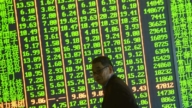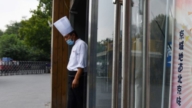【新唐人2013年10月28日訊】目前,中國大陸銀行間資金面突然轉緊,反映市場利率行情的重要指標——上海銀行間同業拆放利率(Shibor)全線上揚,分析指稱,資金利率飆升引發市場對於「錢荒」再襲的憂慮。
10月24號,上海銀行間同業拆放利率(Shibor)全線上升。其中,隔夜利率上漲30.80個基點至4.088%,7天利率上漲68.80個基點至4.68%,14天利率更是上漲101.1個基點至4.882%,1個月利率上漲58.6個基點至5.4%。
25號,繼續延續前一天漲勢,其中1月期同業拆放利率(Shibor)跳漲102.20個基點,14天Shibor利率大漲98個基點。
在銀行間債券市場,當日回購利率漲幅更加驚人。其中,7天回購利率大漲96個基點至5%,14天回購利率則飆漲253.5個基點至6.6%,無論漲幅還是價格,都創下了6月末流動性緊張以來的新高水平。
不僅如此,據中央國債登記結算公司統計,10月24號,國債收益率曲線5年、7年、10年期繼續上行,至3.99%、4.15%、4.19%,再創新記錄﹔受農發行金融債券招標影響,政策性金融債收益率曲線整體上行約10個基點,3年期及以上期限收益率全線進入「5」時代。
另外,從24號開始,央行連續第三次暫停了7月底開始一直使用的逆回購操作。近兩週央行淨回籠資金超過千億元。
中國《證券時報》引述業內人士的話表示,央行公開市場逆回購操作繼續暫停,再遇資金利率飆升,引發市場對於「錢荒」再襲的憂慮,債市一片慘淡,收益率全面上行。
大陸金融分析師任中道:「其實錢荒始終是存在,只不過中共想掩蓋這個問題,一旦央行沒有採取公開市場的操作,也就是向市場放水,那個銀行就覺得錢不夠用了,於是隔夜拆借的利率就往上飆升。」
中國社科院金融市場研究室副主任尹中立認為,6月份的錢荒,是因為各銀行為了月末考核的需要到處找錢,另外加上資金大規模的從中國撤出,以及人民銀行想測試各銀行的承受力,尹中立認為這次央行會吸取上次教訓。
社科院金融市場研究室副主任尹中立:「這個是短期的,可能是月末考核導致的一個短期的波動。」
不過,大陸金融分析師任中道不以為然。
任中道:「銀行之間是非常複雜的一個關係,其實中國就一家銀行,就中共的央行,所謂錢荒就是中共央行錢荒,也就是中共政府在鬧錢荒,因為大量的資金都弄到海外去了,因為中共也知道崩潰在所難免,他們就把錢弄走。」
另外,在美股持續上漲創新高的同時,A股卻連續大跌。在三連陰之後,週五再度單邊大跌1.45%,不僅將2150點重要技術關口洞穿,盤中還將2130點強支撐砸穿,上證指數收盤2132.96點,大跌21.36點,跌幅1.45% ,日線拉出四連陰。
深成指報收8379點,下跌106點,跌幅1.26%。中小板指大跌2.79%,跌幅超過主板一倍以上﹔創業板指數大跌2.06%,四天纍積暴跌8.37%。
在政策面平穩,經濟數據超出預期的背景下,是甚麼導致A股如此暴跌呢?
任中道:「從表面來看各方面資金鍊都比較緊,另一種從最近股市的表現來看,有這樣的跡象,可能資金從股市抽出來到銀行去補血,不到那邊去。」
美國《華爾街日報》撰文指稱,中共當局計劃,企圖讓經濟增長,由投資拉動型向消費拉動型轉型,限制放貸符合這一目標。但是中國央行肯定會如履薄冰:如果動作太大,可能令遭遇過錢荒衝擊的金融業承受更大壓力。
採訪編輯/劉惠 後製/孫寧
Money Shortages Appears in China Again
There are currently more concerns over
inter-bank funds in Mainland China.
An important indicator of this is Shibor
( Shanghai Interbank Offered Rate).
Analysts said that the funds rate soared, causing
the market’s concern over money shortages again.
On October 24, Shibor rose across the board.
Among them, the overnight rate rose
30.80 basis points to 4.088 percent.
Seven day interest rates rose
68.80 basis points to 4.68 percent.
14 day interest rates was up 101.1 to 4.882 percent.
30 day interest rates was up
58.6 basis points to 5.4 percent.
On October 25, the rally continued, including 30 day Shibor
rose 102.20 basis points, and 14 day 98 basis points.
On the same day, the re-purchase rate in the
inter-bank bond market was even more alarming.
Seven- day repurchase rates
rose 96 basis points to 5 percent.
14-day repurchase rates rose
253.5 basis points to 6.6 percent.
Both increases and prices in the bond market
have hit a new level since the month of June.
Statistics from the Central Securities Depository
Clearing Company further indicate this trend.
On October 24, the treasury yield curves of
5, 7 and 10 year continued to climb to 3.99%,
4.15% and 4.19%, which is a record breaking high.
Policy financial bond yield curves, affected by agricultural
development bonds, moved upward about 10 basis points.
Yields over a 3-year period and more all entered the “5” era.
In addition, since October 24, the Central Bank
suspended reverse repurchase operations, implemented
from the end of July, for the third consecutive time.
The net capital returned for about two weeks
for the Central Bank was over 100 billion yuan.
The Chinese Security Times quoted inside sources.
It said that the Central Bank’s discontinuing of
reverse repurchase operations and soaring inter
bank rates triggered concerns over money
shortages, a dismal bond yield and upward return.
Ren Zhongdao, financial analyst: “Actually, money
shortages have always been there, but the Chinese
Communist Party (CCP) just wants to cover it up.
Once the Central Bank stops open market operations-
supplying the market with money- banks feel the presence
of money shortages, so the lending rates soar overnight.”
Yin Zhongli, deputy director of Chinese Academy
of Social Science Research Center, believes that
money shortages in June stemmed from banks
needing money to meet the month-end assessment.
There were also massive capital withdrawal from China,
and Chinese people wanted to test the bank’s tolerance.
Yi thinks that the Central Bank
will learn its lesson from last time.
Yin Zhongli: “This is a short-term volatility, and
it may be caused by the monthly assessment.”
However, Ren Zhongdao thinks differently.
Ren Zhongdao: “Relationships between banks is complex.
In fact, China has only one Central
Bank, which belongs to the CCP.
Money shortages mean the Central Bank is short of money.
This is because a lot of money was transferred overseas.
The CCP also knows their collapse is
inevitable, so they sent money elsewhere.”
Meanwhile, the US stock market continued to rise to
new highs, as A shares in Mainland fell continuously.
On Friday, A shares fell unilaterally
1.45 percent, after three down days.
It not only ripped through 2150,
an important technical barrier.
It also smashed through the strong support point 2130.
By the end of Friday, the Shanghai Composite Index
closed 2132.96 points, falling 21.36 points, or 1.45 percent.
It ended with four losing days in a row.
The Shenzhen component Index closed at
8379 points, down 106 points, or 1.26 percent.
Small and medium board index fell 2.06 percent,
cumulative plunging 8.37 percent in four days.
Under stable policies and better than expected economic
data, what really causes A shares to crash as they have?
Ren Zhongdao: “On the surface, all aspects
are in a relative tight financial chain.
From other stock market scenarios, however, it may be
caused by funds shifting from the stock market to banks.
The Wall Street Journal pointed out that the CCP
attempts to make its economic growth from an
investment-driven to consumer-driven transformation.
It seeks to limit lending falls in line with this goal.
However, the Central Bank is walking on thin ice now.
If it moves too much, it may add more pressure to the
financial sector, which now suffers from money shortages.




























